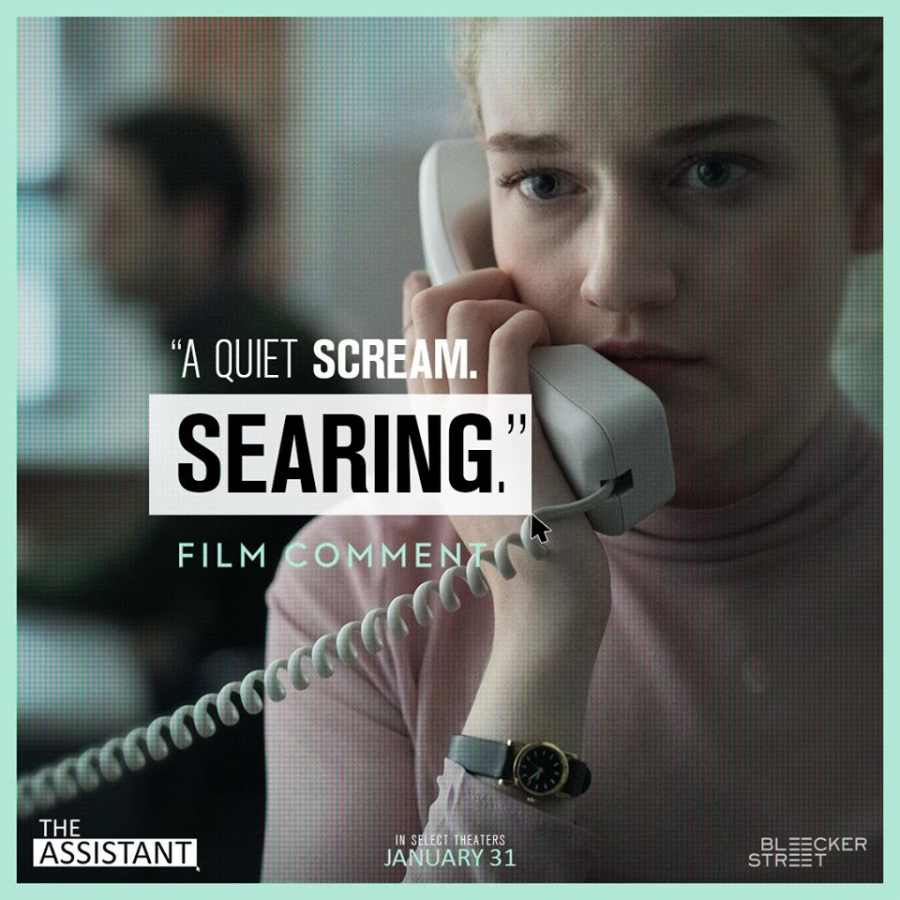“The Assistant” Captures Cyclical Office Abuse
“The Assistant” has all the makings of an A minus on a graduate film school student’s capstone project. The picture begins with a long shot of an SUV idling on a dark and empty street in front of some house. After twenty motionless seconds, a well-dressed woman steps outside and gets in the car. Cut to traffic moving over the 59th Street Bridge, establishing the film’s locale. Next cut is to another empty street, cobblestoned and with higher buildings, where the car stops for the lady to get out.
Then we’re in an office. She maintains a blank stare as she wordlessly turns on the lights and Xerox machines, dusting up some desks and ordering coffee. The camera peers straight down into a bowl of dry cheerios to watch as milk is delicately poured in, as if the angle was supposed to be interesting or inventive. Finally we get some company: a couple of laughing, suited interns, a parade of harried office workers already chattering about meetings and deadlines. The phones start ringing, and our lowly heroine sits mostly left out of the accumulating noise that corporate world emits.
“The Assistant” tells us that we are watching a movie about Jane (Julia Garner), an entry-level secretary working for a Manhattan production company. Painstaking visual storytelling deliberately sidelines verbal exposition to give the audience the pretense of being able to sort out the facts for themselves. It is detectivelike, without a single concession to straightforward, explanatory narration.
This style of filmmaking continues throughout the film, as the production office isn’t an innocuous one. Writer and director Kitty Green never says it outright, but the boss is of the Weinstein school — an abusive, sex-obsessed fiend only present in the film through explosively violent phone calls, objects thrown against office walls and anxious expressions of his underlings.
How are you supposed to film sexual assault? How are you supposed to film it in the context of corporate film producers and their brothelization of the casting couch? Director Green relies on gossip and half-overheard phone calls, suggestive comments and knowing glances. She films nothing but the implications, resting her camera gaze on a collection of office still lifes and charging them up with the indirect traumatic energy that comes from proximity to abuse. We get a bespectacled male assistant dangling a frosted donut from his finger as he asks Jane to pick up a call from the boss’ angry and betrayed wife. We get another producer trying to calm down some incensed Chinese businessmen as they walk to the elevator — tired of waiting for the big man while he was in his office “on a personal.”
Julia Garner’s Jane turns out to be the moral thermometer for this icy, collaborationist office-building. Her joyless blank expression transforming as the film progresses from what seemed like early listlessness caused by corporate-drone work into deadened reaction to the crimes she knows are happening and the verbal abuse she receives from the boss-man.
Practically the only emotion we get from her is a feeling of contrition, but that too is composed, kept under the surface. The tears dry before they wet her cheeks, in muted grey close-ups of the psychological disintegration of this assistant-girl climbing the executive stairs.
The scariest scenes in the movie, though, turn out to be the ones where we worry not that she might speak up, but that in doing so she might lose any hope she could have of being a successful film producer. In this lies the movie’s central tension: despite everything, we still accept the terms of the game, we understand the stakes. We know that speaking out gets you fired, and that speaking out is the right thing to do, but we’re still tempted to hope that Jane wins, to hope that she can get out of this with a career in the end. But at what cost?
Maybe that’s already getting ahead of ourselves. Can she speak out? Against whom? The producer boss is never even given a name: a nameless boss, with nameless colleagues, nameless assistants. It is carefree anonymity, chosen to prove that this drama could play out in any office, and that it does play out, again and again and again.








































































































































































































